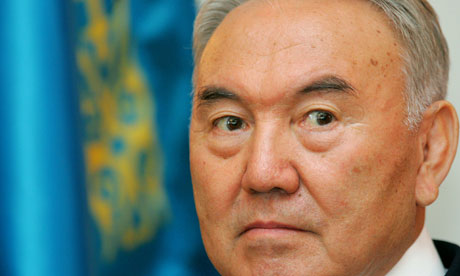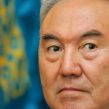
Presidential Health Scare In Kazakhstan Triggers Media Mudslinging Contest On Succession
Publication: Eurasia Daily Monitor Volume: 8 Issue: 145
By:

Discussion about who might become the next president of Kazakhstan after the long-serving incumbent, Nursultan Nazarbayev, leaves the political scene has been a favorite pastime for years for anyone with a professional interest in the country. Last week, these conversations were fueled by media reports that Nazarbayev, 71, had allegedly undergone prostate surgery in a hospital in Hamburg in northern Germany and was recovering well. The news, published by the German mass-circulation tabloid Bild on July 19 and 20 without citing sources, could not be confirmed independently. Kazakh officials have so far acknowledged only that Nazarbayev usually has two physical checkups per year, one in Kazakhstan and one abroad.
Officially, Nazarbayev was on a short vacation, as announced on the presidential website on July 11. Although he returned to the capital Astana and resumed his formal duties on July 21 with a very busy schedule, speculation about his health has unnerved many inside and outside of Kazakhstan.
“If there was really only a checkup, where is the professionalism of the press secretaries and PR managers [and why were they] unable to calm down public opinion,” says Aleksandr Sobyanin, head of the strategic planning service of the Moscow-based Association of Border Cooperation (www.guljan.org, July 21).
Nazarbayev, in power since 1989 and, together with Uzbekistan’s President Islam Karimov, is the longest serving head-of-state in the former Soviet Union, has never given any indication he will step down during his lifetime. His liberal free market reforms have turned oil-rich Kazakhstan into the economic locomotive of Central Asia and attracted many billions of dollars in investment. He stated in January that he was ready to stay on as long as his people and his health would allow. In April, the authoritarian ruler, who was granted the title of “leader of the nation” by parliament in 2010, was re-elected for another five year term with more than 95 percent of the votes.
If the president becomes incapacitated or dies in office, the constitution provides for the chairperson of the Senate, the upper house of parliament, to serve out the remainder of the term. In reality, there is no certainty that the constitutional rules of succession would in fact be observed. In Turkmenistan, the constitution was blatantly ignored when President Saparmurat Niyazov died in office almost five years ago. International organizations have therefore said they view the transition period following Nazarbayev’s departure as Kazakhstan’s greatest political risk. And now, for the very first time, the succession question seems to loom in earnest. At the very least, the debate has moved away from the merely theoretical “what if” to the practical “when,” as individual interest groups are openly beginning to mobilize and to position themselves.
Following the April presidential elections, it was widely presumed – or rather hoped – that Nazarbayev would use his new term to finally groom a successor to preserve his own legacy and to avoid possible chaos. The most notable post-election appointment was the elevation of Timur Kulibayev, the president’s billionaire son-in-law and leading oilman, to the position of chairman of the sovereign wealth fund Samruk-Kasyna. The fund controls strategic industries, such as oil, uranium, and the railways and holds assets worth more than $80 billion. Kulibayev, who is married to Nazarbayev’s middle daughter Dinara, has frequently been mentioned as the likely heir by observers in the last few years. But he is by no means the only plausible candidate.
“Practically any representative of the Kazakhstani elite – and there are many of those – sleeps and sees himself in the armchair of the president,” says political scientist Dosym Satpayev. In case of “force majeure,” any one of them may turn to his group or to a coalition of several such groups to put their candidacy forward. In this lies the seed for potential conflict. Political decisions in Kazakhstan are made behind the scenes, not through political institutions, such as parliament or political parties, he says (www.guljan.org, July 21).
After last week’s wake-up call, when Bild had first only reported Nazarbayev’s secret check-in into the University Medical Center Hamburg-Eppendorf, his ex-son-in-law Rakhat Aliyev was one of the first to comment. He offered a diagnosis on his blog saying the head-of-state was suffering from prostate cancer. One week later, on July 26, he went even further to claim that Nazarbayev has been battling the disease for already five years (www.respublika-kz.info, July 26). It is uncertain whether these allegations are true or fabricated. Aliyev himself once had designs on the presidency, which has been attributed by some to be part of the reason for his falling out with Nazarbayev in 2007. A former ambassador to Austria, he was stripped of his post, was divorced from his wife Dariga, the president’s oldest daughter, and has been living in European exile since then. In 2008, he was sentenced by a Kazakh court in absentia to 40 years in jail for kidnapping, extortion, and treason. He has been a vocal opponent to Nazarbayev and has been drip feeding personal and confidential information on the first family and its closest allies on the Internet. A change of power could bring about his return to Kazakhstan.
The exiled Kazakh banker and former opposition leader Mukhtar Ablyazev, who has been living in London since 2009, candidly explained in a television interview on Kplus why Kulibayev could not become president. In his view, Kulibayev lacks the ability to fight for power because everything he has achieved has been handed to him as a result of his family ties. He might become president if Nazarbayev so designates him, says Ablyazov, but he would not manage to hold on to this post for very long (www.respublika-kz.info).
Ablyazov sees presidential qualities and ambitions in Prime Minister Karim Massimov, who has worked hard to get to where he is. He has outgrown Kulibayev, who was once seen as his patron, and has proved himself to be extremely loyal to Nazarbayev and discreet, Ablyazov says. In addition, he knows how to flatter the right people and how to find compromise.
This is a new development, as Massimov was long viewed as an impossible candidate for president because of his ethnic Uighur background. When he was appointed prime minister in January 2007, the Kazakh government was said to be run by the Massimov-Kulibayev tandem, a name no longer in use.
Massimov is not a reformer, says Ablyazov. If he became president, there would be little change in Kazakhstan’s political structure. However, he would cleanse the entire bureaucracy from the people related to the Nazarbayev era, he says.
A few days later, Nazarbayev’s political advisor Yermukhamet Yertysbayev offered his opinion on the situation in an interview in the Russian newspaper Kommersant. He accused Ablyazov of strategically seeking to put Kulibayev in a bad light. “He and Rakhat Aliyev are dreaming about a palace revolution,” Yertysbayev says. In case of an emergency situation related to the unexpected leave of the head-of state, it would precisely be “Kulibayev who can continue the president’s strategic course,” he says. Kulibayev was one of the best students of the Economy School of Moscow State University and has ample experience in state management and politics (Kommersant, July 25).
Yertysbayev’s comments may have been a trial balloon to gauge the public’s response to the idea of a Kulibayev presidency. They may also have been his attempt to line up on the right side of the fence ahead of time, as he will need to find a new patron eventually.
But Kulibayev was evidently not pleased with this endorsement. “To be honest, this announcement was unexpected for me,” he said according to the Kazakhstani newspaper Vremya. “I have never positioned myself as a politician. As you know, I have dealt with economic questions for a long time, and that is what I like.” He said that it was inappropriate to speak about such things after the noise made in the media about the president’s health. He said he wants to soon meet and talk with Yertysbayev. “What he said in his interview in the newspaper Kommersant was complete nonsense,” Kulibayev said (Vremya, July 26).
Given Kazakhstan’s limited freedom of speech, this lively media exchange to date has been remarkable. It was the start of what promises to be a protracted battle for influence and for the most coveted position in the country.




